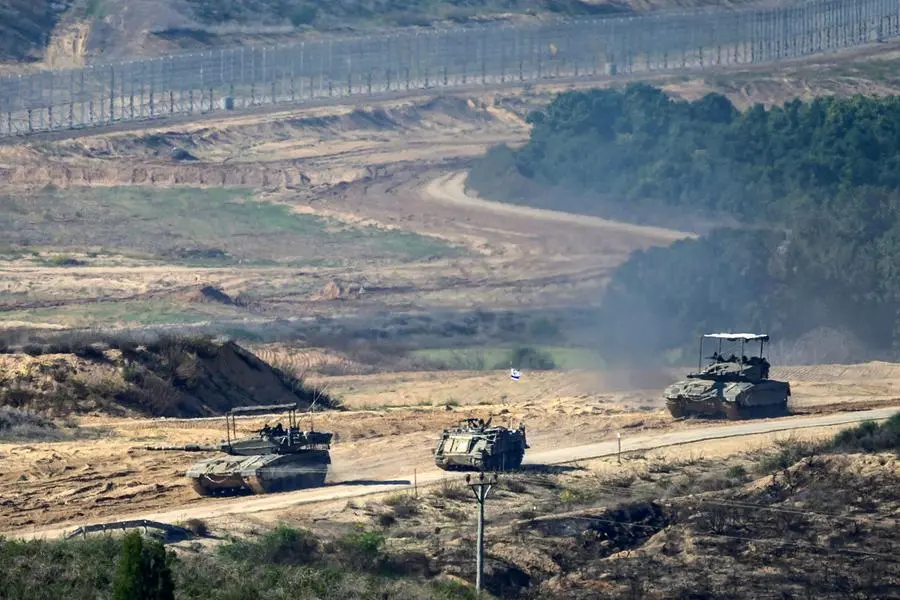PHOTO
Dozens of Israeli tanks rolled into southern Gaza on Monday, witnesses said, despite global concern over mounting civilian deaths and fears the war on Hamas will spread elsewhere in the Middle East.
Weeks after Israel sent ground forces into northern Gaza, the army has been air-dropping leaflets in parts of the besieged territory's south, telling Palestinians to flee to other areas.
Tanks, armoured personnel carriers and bulldozers were seen Monday near the city of Khan Yunis, which is crowded with internally displaced Palestinians, witnesses told AFP.
Amin Abu Hawli, 59, said the Israeli vehicles were two kilometres (1.2 miles) inside Gaza in the village of al-Qarara, while Moaz Mohammed, 34, said Israeli tanks were moving down the strip's main north-south highway, the Salah al-Din road.
The military was trying to cut the road between Deir al-Balah in central Gaza and Khan Yunis, "firing bullets and tank shells at cars and people trying to move through the area," Mohammed said.
Israeli Defense Forces spokesman Daniel Hagari said Sunday that the army "continues to expand its ground operation against main Hamas fronts in the Gaza Strip".
"Wherever there is a Hamas stronghold, the IDF operates," he added.
Full-scale fighting resumed Friday after the collapse of a week-long truce brokered by Qatar, the United States and Egypt, during which Israel and Hamas had exchanged scores of hostages and prisoners.
Air strikes have since intensified in Gaza's south, said James Elder, a spokesman for the United Nations children's agency UNICEF.
"Despite what has been assured, attacks in the south of Gaza are every bit as vicious as what the north endured," he posted Monday on X, formerly Twitter.
"Somehow, it's getting worse for children and mothers."
- Trapped under rubble -
Sheltering at the Al-Aqsa hospital, Walaa Abu Libda said her four-year-old daughter was trapped under rubble.
"I don't know if she dead or alive," she said, one of an estimated 1.8 million people displaced in Gaza -- roughly three-quarters of the population.
Israel has vowed to crush Hamas in retaliation for the Islamist militant group's October 7 attacks that killed about 1,200 people, mostly civilians, and saw 240 hostages taken, according to Israeli authorities.
Israel's military said Sunday it had carried out around 10,000 air strikes in total, while Gaza militants had resumed rocket salvos into Israel, most of which had been intercepted.
The Hamas-run health ministry says more than 15,500 people have been killed in Gaza, about 70 percent of them women and children -- a death toll that has sparked global alarm and mass demonstrations.
The Israeli army said Monday three more soldiers had been killed in fighting in the northern Gaza Strip, raising the number of troop deaths there to 75.
The fatalities brought to 401 the number of Israeli defence personnel killed since October 7, among them those killed in the Hamas attacks themselves and including soldiers, reservists, kibbutz guards and others.
Under the temporary truce that expired Friday, 80 Israeli hostages were freed, in exchange for the release of 240 Palestinians held in Israeli jails. More than two dozen Thai and other captives were also released from Gaza.
With at least 137 hostages still held in Gaza, according to the Israeli military, Hamas has ruled out more releases until a permanent ceasefire is agreed.
More air strikes have rained down on northern Gaza where Hamas's armed wing reported clashes with Israeli tanks.
It said rocket fire targeted Israeli communities near the border.
- 'Like an earthquake' -
In the southern Gazan city of Rafah, resident Abu Jahar al-Hajj said that his home had been rocked by an air strike that felt "like an earthquake".
"The earth shook, and the sound was so loud. Pieces of concrete started falling on us," he said.
Israel's ally the United States has intensified calls for the protection of Gaza's civilians, with Vice President Kamala Harris saying that "too many innocent Palestinians have been killed".
A White House official said Sunday the United States believes Israel is "making an effort" to minimise civilian casualties in Gaza.
International Committee of the Red Cross president Mirjana Spoljaric, visiting Gaza, described the suffering as "intolerable".
Israel said that it was not seeking to force Palestinian civilians to permanently leave their homes.
"We have asked civilians to evacuate the battlefield and we have provided a designated humanitarian zone inside the Gaza Strip," military spokesman Jonathan Conricus said, referring to a tiny coastal area of the territory named Al-Mawasi.
Any suggestion of Palestinian dispersal is highly contentious in the Arab world as the war that led to Israel's creation 75 years ago gave rise to the exodus or forced displacement of 760,000 Palestinians.
With fears of a wider regional conflagration rising, a US destroyer shot down multiple drones over the Red Sea while assisting commercial ships on Sunday, according to the US Central Command.
Yemen's Iran-backed Huthi rebels -- who said they targeted two of the ships -- launched a series of drones and missiles towards Israel in recent weeks and seized a cargo vessel last month.
In Iraq, an air strike killed at least five pro-Iranian militants on Sunday, according to Iraqi security sources, a day after Baghdad warned Washington against "attacks" on its territory.
Fighting also flared on Israel's northern border with Lebanon.
The Israeli army said it had launched artillery strikes in response to cross-border fire, and its fighter jets hit targets linked to Iran-backed Lebanese militant group Hezbollah.
An Israeli fighter jet also intercepted a "hostile aircraft" coming from Lebanon, it said.
The Israel-occupied West Bank has also seen a surge in violence since October.
The Palestinian Authority's health ministry said two Palestinians had been shot dead in an Israeli raid on the northern West Bank town of Qalqilya, adding that Israeli forces kept the two bodies.





















